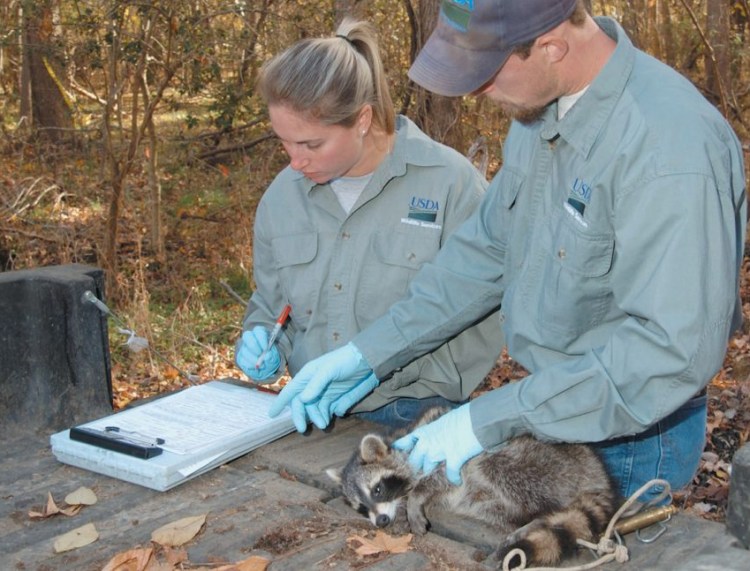The United States Department of Agriculture will soon spread more than 300,000 rabies vaccine baits in Maine to stem the spread of rabies in raccoons, but that effort won’t extend to the Midcoast, where one hospital saw a surge of people being treated for rabies last year.
The fishmeal-coated baits will be distributed over a 2,405-square-mile area in northeast Maine by land and by air-drops between Saturday and Aug. 7. The bait is designed to target raccoons, the species with the highest number of rabies cases in the eastern U.S.
“However, the vaccine is safe in many species, and is effective in targeting other wildlife such as foxes and coyotes as well,” USDA spokeswoman Tanya Espinosa stated in an email Tuesday. “If these species consume an ORV bait, they may also be vaccinated against the disease.”
As of July 23, 49 raccoons, bats, skunks and foxes have tested positive for rabies this year in 12 of Maine’s 16 counties.
According to the Maine Center for Disease Control and Prevention, 11 of those cases were found in the Midcoast. Bath alone has had five wild animals test positive for the viral disease. This oral vaccine has been shown to be safe in more than 60 species of animals, including domestic dogs and cats.
But wildlife officials say they must stem the spread of rabies in northern Maine before tackling points south.
“Before management efforts are focused in the southern part of the state, we need to eliminate the risk of further rabies spread in northern Maine,” Espinosa said. She said it is cost-prohibitive and not logistically feasible to drop the oral vaccination baits statewide in Maine or any other state.
“We have to shut the door first on high risk spread corridors throughout the eastern U.S., including the area we are currently working in Maine, before we can start to incrementally eliminate rabies at the local level,” she added.
Last year saw an increase of rabies incidents in Brunswick, where nine animals in Brunswick tested positive for rabies, according to the Maine Center for Disease Control and Prevention. Seven people were attacked by rabid foxes there in 2018.
Another three animals tested positive for rabies last year in Lisbon, two in Bath, four in Bowdoin and one in West Bath. Statewide, a total of 101 animals tested positive for rabies by the Health and Environmental Testing Laboratory and USDA APHIS Wildlife Services. The majority were raccoons (51), skunks (25), gray foxes (9) and bats (12).
The process has occurred annually since 2003. The vaccine packets will be distributed by airplanes in rural, wooded areas. Personnel from the USDA’s Wildlife Services will distribute vaccine baits from vehicles in the more populated areas.
Rabies is a viral disease that infects the nervous system of mammals. It is transmitted primarily through bites from an infected animal. It attacks the nervous system, making the infected animal unusually aggressive and is fatal.
In June, a man in West Bath attempted to kick what he thought was a dead fox from the road on Harbor Ridge Road when the fox attacked. In May, a woman and two dogs were attacked by a gray fox at a Pond Road home in Bowdoinham and were treated for rabies exposure.
Last year Mid Coast Hospital treated a much larger number of people for rabies than in past years. According to Ranjic Advani, president of the hospital’s medical staff, the Mid Coast Hospital Emergency Department has treated anywhere from 10 to 30 people every year over the last decade for rabies exposure. In 2018, that surged to more than 50 patients treated for potential rabies exposure, he said.
Experts say the virus isn’t going to be eradicated anytime soon, and the USDA expects it will take at least 30 years to eliminate raccoon rabies.
“Rabies elimination is a long-term goal that will include current and novel strategies, but will require sustainable resources in order to succeed,” she said. “We just now have spent 8 years field testing a vaccine that will give us the tool to pursue elimination, but it will take additional resources to aggressively move toward elimination.”
Send questions/comments to the editors.



Success. Please wait for the page to reload. If the page does not reload within 5 seconds, please refresh the page.
Enter your email and password to access comments.
Hi, to comment on stories you must . This profile is in addition to your subscription and website login.
Already have a commenting profile? .
Invalid username/password.
Please check your email to confirm and complete your registration.
Only subscribers are eligible to post comments. Please subscribe or login first for digital access. Here’s why.
Use the form below to reset your password. When you've submitted your account email, we will send an email with a reset code.